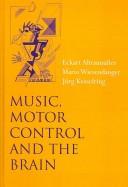| Listing 1 - 2 of 2 |
Sort by
|

ISBN: 0199298726 9780199298723 0198530005 9780198530008 Year: 2006 Publisher: Oxford Oxford University Press
Abstract | Keywords | Export | Availability | Bookmark
 Loading...
Loading...Choose an application
- Reference Manager
- EndNote
- RefWorks (Direct export to RefWorks)
The motor actions that can be witnessed as a virtuoso musician performs can be so fast, so accomplished, so precise, as to seem somehow superhuman. The musician has to produce the movements, monitor those they have already made and the subsequent result, co-ordinate their hands, fingers, eyes, and perhaps throat and diaphragm. These achievements are of course the product of hundreds, even thousands of hours of practice-playing scales, studies, time and time again. But those hours of practice by no means guarantee that great musicianship will result. This technical prowess has to be combined with a range of other, perhaps, less tangible qualities. This book explores the secrets of musical virtuosity. It presents a comprehensive account of music and motor cognition, examining the neural basis of music making - our understanding of which is just starting to be enhanced by brain imaging. It considers the effect on our brains of prolonged music making. It explores the motor processes across a range of instruments (vocal, string, wind, percussion) and within different performance situations. It also considers what happens when things start to go wrong - why motor problems occur in so many professional musicians in later life, and the possible therapies for such problems. Music is a topic of considerable interest within the brain sciences. With contributions from leading psychologists, neuroscientists, and neurologists, this book makes a unique contribution to our understanding of music and the brain.
Music --- Sensorimotor integration. --- Motor Activity --- Music. --- Brain --- Psychomotor Performance. --- Physiological aspects. --- Psychological aspects. --- physiology. --- Musique --- Intégration sensorimotrice --- Aspect physiologique --- Aspect psychologique --- Motor activity --- Intégration sensorimotrice --- Sensorimotor integration --- Integration, Sensorimotor --- Intersensory integration --- Perceptual-motor integration --- Sensimotor integration --- Sensory integration --- Sensory-motor integration --- Music psychology --- Music physiology --- Physiological aspects of music --- Physiological aspects --- Psychological aspects --- Psychology --- Perceptual-motor processes --- Sensory integration dysfunction
Book

ISBN: 2753564116 2753510776 Year: 2018 Publisher: Rennes : Presses universitaires de Rennes,
Abstract | Keywords | Export | Availability | Bookmark
 Loading...
Loading...Choose an application
- Reference Manager
- EndNote
- RefWorks (Direct export to RefWorks)
Cet ouvrage de recherche fondamentale et appliquée intéressera non seulement les chercheurs et étudiants avancés de plusieurs disciplines situées au sein ou aux frontières des sciences cognitives (psychologie cognitive, psycholinguistique, neuropsychologie, neurosciences, musicologie…), mais aussi tous ceux qui aiment la musique. Il illustre le foisonnement récent des connaissances neuroscientifiques au sujet de la musique – art et jouissance de plus en plus présents dans notre vie quotidienne – et de ses relations avec le langage et les émotions. Les spécialistes les plus renommés y abordent la perception des structures musicales dans ses relations avec le langage (Barbara Tillmann et coll. ; Emmanuel Bigand et coll.), le rôle et l'importance des émotions dans la musique ainsi que les éventuels dysfonctionnements du traitement de ces émotions (Oliver Grewe et coll. ; Séverine Samson et coll. ; Régine Kolinsky et coll.), et, enfin, les troubles profonds d'origine congénitale des capacités musicales (Isabelle Peretz et coll.). Les principaux moyens d'investigation scientifique dans le domaine de la cognition musicale (comportemental, électrophysiologique, étude de patients et des activations cérébrales, simulation par « réseaux neuronaux ») y sont aussi représentés. Comme l'écrivent les organisateurs, dans le domaine de la musique, « en matière de connaissances scientifiques, que ce soit par le brassage des techniques ou par le métissage des domaines, notre défi pour le futur sera de chanter en chœur ».
Psychology, Educational --- émotions --- sciences cognitives --- langage --- musique
| Listing 1 - 2 of 2 |
Sort by
|

 Search
Search Feedback
Feedback About UniCat
About UniCat  Help
Help News
News